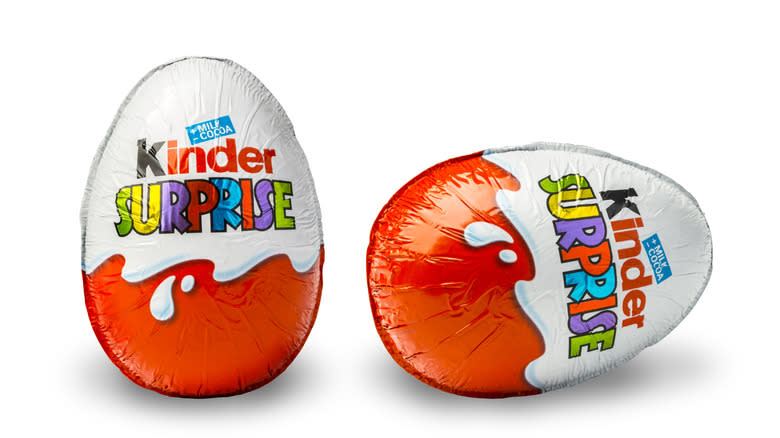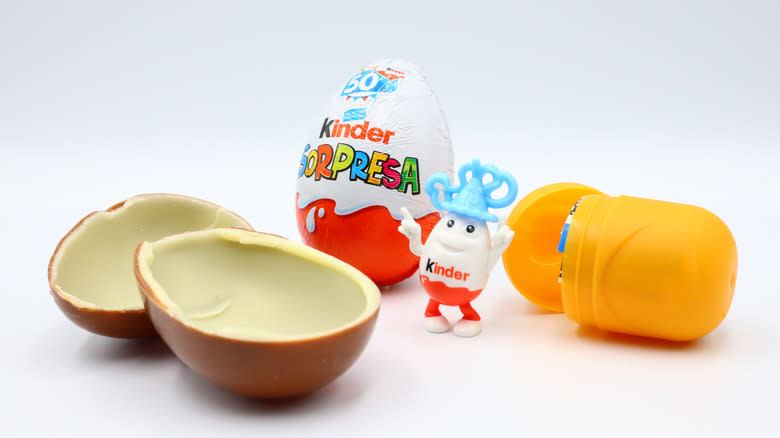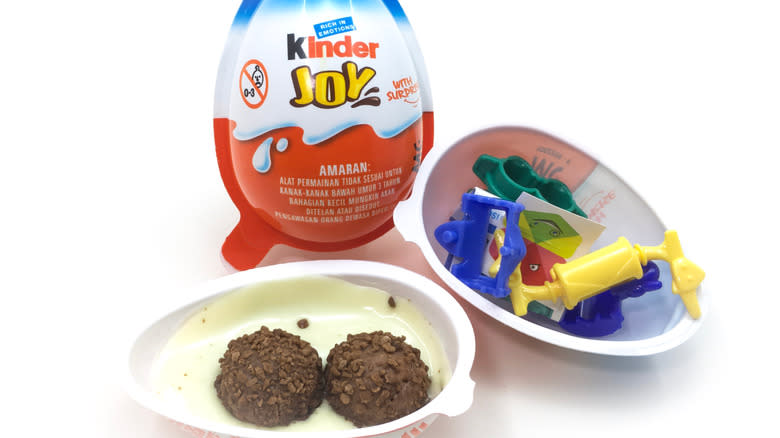Why Kinder Surprise Eggs Are Illegal In The US

For those who live outside of the United States, you may be surprised to find that you can't buy Kinder Surprise eggs in America. William Salice invented the Kinder Surprise eggs out of Easter egg molds. Despite selling around 1.2 billion candy eggs per year globally, Italian company Ferrero is banned from selling the eggs in the U.S. The candy features a chocolate egg shell housing an inner plastic egg. Within these plastic eggs is typically a toy. Since the plastic egg and toy are considered inedible and shouldn't be eaten, it breaks the 1938 Food, Drug, and Cosmetic Act.
In 2011, a Ferrero spokesperson clarified to Metro why it can't sell its Kinder Surprise eggs in America, saying, "Kinder Surprise is not available in the United States as the [FDA] has taken the position that a specific regulation relating to non-nutritive objects embedded in food stuff makes Kinder Surprise not suitable for sale and distribution in the U.S." According to the 1938 Act, consumable items are banned if it "has partially or completely imbedded therein any nonnutritive object." Essentially, Kinder Surprise eggs are banned in America because they pose a choking risk to consumers. The plastic toy inside is seen as non-essential to the item, whereas a Tootsie Roll sucker stick gets a pass because it's needed for functionality.
Read more: What These Imitation Foods Are Actually Made Of
Kinder Surprise Eggs Are Prohibited

Not only are Kinder Surprise eggs prohibited from being sold in America, but they're also prohibited from being brought across the border as well. It's a fact that's caused grief for some travelers unaware of the ban. In an interview with FEE Stories, one startled traveler thought border control were joking when they said they were confiscating their Kinder Surprise eggs, but this wasn't a joking matter. A fine for a single Kinder Surprise egg can be as much as $2,500, making it a costly mistake for those unaware of the law.
"Kinder eggs are prohibited just like narcotics are prohibited," U.S. Customs and Border Protection spokesperson Mike Milne told FEE Stories. "Our officers, if they encounter prohibited stuff, they're subject to seizure."
The amount of Kinder Surprise eggs confiscated varies year to year but ranges in the several thousand. For instance, in 2011, border control seized 60,000 Kinder Surprise eggs. Meanwhile, that number was slightly less at 30,000 in 2015. While people do make mistakes when it comes to accidentally bringing Kinder Surprise eggs into the U.S., there's also a black market for the candy as well. Holidays like Easter raise the desire for the banned candy.
Kinder Joys Are Legal

As mentioned above, the risk of choking seems to be the main reason for the ban in the United States. However, how many people have actually died from choking on the toys? Although the number is low, a few children have died from choking on the toy. In 2016, a three-year-old girl in France died after a choking incident caused brain damage. Critics have pointed out that on average 140 children die choking on other foods like grapes every year, but the ban remains.
However, that hasn't stopped other companies from attempting to challenge the 1938 Act. In 1997, Nestle introduced a similar product to Kinder Surprise called the Nestle Magic. It featured a toy inside the candy. Despite the candy company going to bat in a lengthy legal process, Nestle was forced to pull Nestle Magic from the stores, making it banned like Kinder Surprise before it.
That being said, there are Kinder products available in the United States. The company introduced Kinder Joy, which is egg-shaped but not actually an egg. It features a toy in a separate pouch making it legal. As far as the candy portion, it's a white chocolate mixture with wafers.
Read the original article on Daily Meal.

